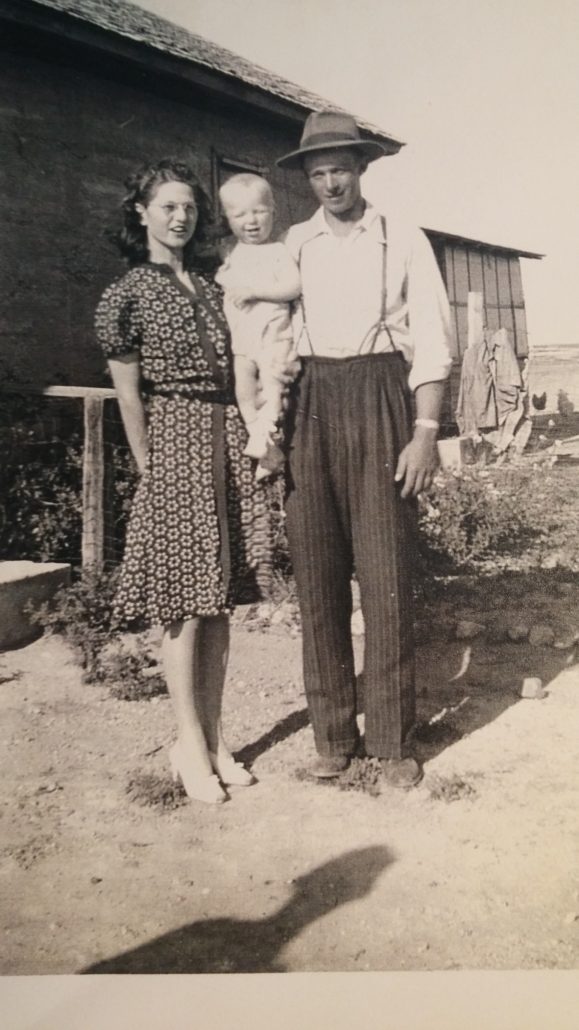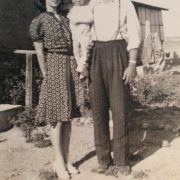Did You Choose Your Parents Wisely? Doesn’t Matter!!

The parents I chose (circa 1943)
Mom died at 56.
Dad beat the national average at the time by a couple of years – dead at 81.
Mom – cancer.
Dad – COPD, heart failure.
I’m guessing genetics had little to do with their demise. We don’t really know because, during their halcyon years (’30s-’60s), we barely knew how to spell the word let alone use it to predict health or longevity.
What I do know is that if genetics were at play with them, they didn’t help much as they lit up their Luckies day in and day out.
I have to confess to similar naivete on the topic for many of my earlier years. I smoked for 18 years also, shedding stupid finally at age 37.
I remember, probably 35-40 years or so ago, my wife and I read an article in Parade Magazine that suggested you could determine your longevity by averaging the age-at-death of your parents and grandparents.
We bought into the pitch and did the math over breakfast. The numbers we came up with didn’t leave any deep impression because – well, it was Parade Magazine and the numbers were far off in the future. Plus the eggs were getting cold.
Based on my best recall of the results, I’ve been dead for about 11 years now. She? About the same.
Why should you care about genetics?
Today, it’s a pretty big deal. Lots of talk of genetics. Lots of progress in getting our arms around it and what it is/does and isn’t/doesn’t do.
But, I’m not sure we are getting the right message.
A century ago, we fell off the mortal coil at an average age of around 50. Our equivalent of a genetic explanation then was that it is was “God’s will.” Or, “fate,” if you will. Choice hadn’t really caught on because science was just beginning to get a foothold in understanding our biology.
I think you and I should care because there remains an entrenched remnant of acceptance of “God will” and genetics as the main determinant of our longevity and long-term health.
I believe that’s a problem.
Please don’t confuse me with a geneticist or medical expert – –
– – but, you see I have this genetic predisposition (did I just say that?) to read a lot. I inherited it from my daughter. Except I read dry stuff like about health and wellness and longevity and diet and exercise and brain stuff (she just reads simple stuff for enjoyment, like Tolkien and “Lord of the Rings”).
On any given day I may read someone (amongst the uninformed) saying that your key to longevity is to “pick your parents wisely” and that genetics is the main determinant.
The next day I may read experienced medical experts that take a firm stand that genetics as a determinant of longevity is “encapsulated in a layer of myths in our society – and include a confusing blend of truth and fancy.” Those are the words of John W. Rowe, M.D, and Robert L. Kahn, M.D. co-authors of the seminal book “Successful Aging” that reports the results of the acclaimed McArthur Foundation Study, one of the most extensive, comprehensive studies on aging in America.
The authors go on to say (my bolding):
“True, there is a meaningful connection between genetics and aging. For instance, it has long been recognized that the length of life of non-identical twins varies much more than that of identical twins. But while the role of genetics in aging is important, it has been tremendously overstated. A common error is to assume that one’s genetic predisposition is equivalent to genetic “control” of life expectancy, and that we are all preprogrammed for a given duration of life. Our MacArthur twin studies leave very substantial room for factors other than genetics in determining life expectancy.”
Or, in my third reading of “The Roadmap to 100: The Breakthrough Science of Living a Long and Healthy Life” by one of my heroes, Dr. Walter Bortz, retired Stanford geriatric physician, I come across this highlighted statement:
“Further studies of identical and fraternal twins indicate that heredity accounts for as little as 15-20 percent of the difference in human longevity. A study of Swedish twins published in 1998 seems to establish an upper limit of the genetic contribution to 33 percent. It is more generally assumed that the genetic contributions to our overall health and our prospects for longevity fall within a range around 20 percent to 25 percent.”
Let’s roll with the docs!
– at least on this topic.
Drs. Rowe and Kahn point out that “as we grow older genetics becomes less important, and environment becomes more important. The likelihood of being fat, having hypertension, high cholesterol and triglyceride levels, and the rate at which one’s lung function declines with advancing age are, by and large, largely not inherited.”
Ever been at a dinner party with “folks of advancing age” and hear the statement from an attendee: “I’m lucky. My grandmother lived to 102, my dad to 95, and my mom to 90. So, I’m from a good gene pool.” And in the next breath state that exercise is overrated or too difficult and that all this business about a meat-based diet being bad is all a bunch of hooey.
It’s easy to hide behind the “gene pool” myth and use it as an excuse to avoid the real elements behind increasing the odds of extended longevity.
- Proper diet
- Exercise
- Social engagement
- Continuous learning/mental challenge
It’s all about “gene expression.”
You and I carry a bunch of bad genes. We all do.
Bad genes don’t count unless they choose to express themselves.
The public perception that specific genes control specific functions and determine specific health outcomes, such as the onset of a great many diseases, doesn’t hold up because genes must be expressed. In Dr. Bortz’s words “–they are like switches that must be turned on in order to perform their designated functions.” Maybe more like a dimmer switch with variable responses, not just simple on or off.
There are no guarantees genes won’t express but no need to help the bad ones get vocal. That’s where our lifestyle comes into play, early or late. (See the list above.)
It’s never too late to start, but always too early to quit.
If you are counting on your impressive gene pool while loving your voice-controlled remote and Netflix 49 hours a week (the U.S. national average for TV viewing by men over 65), I believe you are inviting some nefarious genes to wake up and express.
That’s in the choice category, not fate.
Fate left the conversation a half-century ago.
What is your bad gene expression action plan? What are your thoughts on this topic? Have any interesting stories to tell on this topic? Tell us with a comment below. We’d love to hear them. If you aren’t on our list to receive our weekly article (FREE!!), join us by going to www.makeagingwork.com, sign up, and get a copy of our ebook “Achieving Your Full Life Potential.”





Leave a Reply
Want to join the discussion?Feel free to contribute!